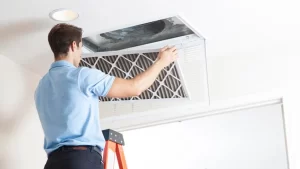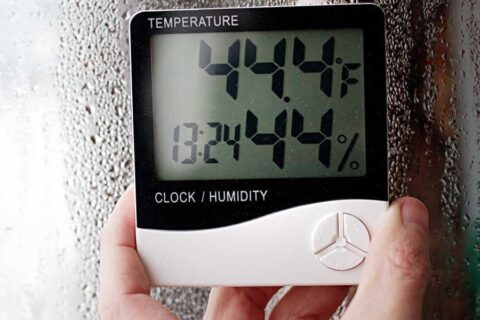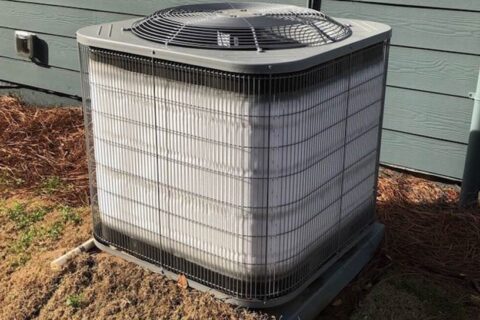The Financial Benefits of Seasonal HVAC Maintenance
Key Takeaways
-
Seasonal HVAC maintenance is essential to ensuring your system runs at peak efficiency no matter the weather. This improves home comfort as well as system reliability.
-
Regular maintenance is found to greatly prolong the service life of HVAC systems, saving costs on needless replacements and repairs.
-
Regular maintenance keeps your system running at higher energy efficiency, saving money on energy bills, and decreasing the likelihood of an emergency breakdown.
-
Regular maintenance helps to keep your system running at peak performance and helps create healthier indoor air by removing allergens and pollutants.
-
DIY tasks such as cleaning or replacing filters and checking thermostat settings can complement professional services and contribute to efficient operation.
-
Selecting a trustworthy provider for seasonal HVAC maintenance requires checking credentials, service offerings, and customer testimonials to make an informed choice.
Seasonal HVAC maintenance is key to keeping your home comfortable and efficient. Regular check-ups on your heating, ventilation, and air conditioning systems help in avoiding unexpected breakdowns, saving money on costly repairs. Schedule seasonal maintenance before the seasons do. This ensures your system is running at peak performance when you need it the most!
Taking this proactive approach goes beyond just improving your energy efficiency and lowering your utility bills. It actually helps to prolong the lifespan of your equipment, too. Seasonal maintenance consists of tasks such as cleaning or replacing filters, inspecting and cleaning evaporator and condenser coils, and testing refrigerant levels.
From reducing asthma triggers to having better indoor air quality overall, these basic steps can help you enjoy a healthier home. Seasonal HVAC maintenance is an opportunity to choose comfort, savings, and peace of mind.
What is Seasonal HVAC Maintenance
Seasonal HVAC maintenance means having your system maintained on a seasonal basis. This annual process helps your heating, ventilation, and air conditioning (HVAC) systems operate at peak efficiency.
This preventative practice includes a robust list of cleaning components, performing detailed inspections, and changing air filters. Because the weather is changing, adapting your home’s systems to the best practices is more important than ever.
All of these efforts improve comfort and control energy use.
Definition of HVAC Maintenance
HVAC installation and maintenance is the practice of ensuring systems are regularly serviced. Routine checks are paramount to avoiding inefficiencies and at the same time preventing a potential breakdown.
This maintenance isn’t just about bringing in the pros, it also involves some DIY maintenance like changing out your filters and calibrating your thermostat.
It’s the best way to improve your home’s efficiency and ensure your family’s safety and comfort year-round. They save 10% to 20% in energy use.
Key Components of HVAC Systems
HVAC systems consist of several key parts: the furnace, air conditioner, ductwork, and thermostat. Each component has an impact on overall system performance.
The furnace heats your home, the air conditioner cools it, ductwork moves air around your home, and the thermostat controls the temperature. These components are interdependent, so comprehensive maintenance is required.
Regular seasonal maintenance, like checking and changing air filters, sweeps the indoor air of allergens like dust and pollen, promoting a healthy environment.
In fact, with good maintenance, energy use can be reduced by 5% to 30%, preventing the 30% to 60% increase in energy use resulting from bad maintenance.
That means you’ll enjoy reliable heating and cooling, your system will last longer and you’ll save money on utility bills.
Importance of Seasonal HVAC Maintenance
Seasonal HVAC maintenance is one of the best ways to ensure your home remains a comfortable and safe environment no matter the season. Preventative maintenance sees to what could be problems ahead of time. This preventive measure increases the reliability of HVAC systems, helping them to deliver long-lasting comfort.
Skipping out on these routine maintenance steps doesn’t just escalate energy expenses — it invites unexpected repair costs. Spending money on regular maintenance is a wise economic investment.
1. Enhances System Longevity
Proper seasonal maintenance can go a long way toward maximizing the life of HVAC systems. Cleaning those coils and checking the refrigerant levels are important to do as well. They allow the system to run steadily and avoid heavy duty wear and tear.
The long-term savings come from not having to replace it prematurely and by keeping the unit running for years past its normal life expectancy.
2. Improves Energy Efficiency
Well-maintained HVAC systems use less energy, which lowers your utility bills. For example, dirty filters can force your HVAC system to work harder, using more energy in the process. Simple regular maintenance practices, like changing dirty air filters, can help your system operate as efficiently as possible.
This provides energy savings and less humidity, increasing home comfort.
3. Reduces Repair Costs
Regular seasonal maintenance can identify and address small problems before they turn into expensive repairs. Highly-trained professional technicians are trained to look for potential hazards and issues during seasonal maintenance checks.
Their knowledge keeps you worry-free and almost eliminates the chances of an unexpected breakdown.
4. Ensures Optimal Performance
Regular, seasonal HVAC maintenance, including routine inspections and adjustments, helps protect your investment and ensure your HVAC system is running at peak performance, positively influencing home comfort and improving energy efficiency.
5. Promotes Healthy Indoor Air Quality
There’s a clear connection between seasonal HVAC maintenance and better indoor air quality. Cleaning or replacing air filters removes known allergens from your home.
Preventing this debris accumulation creates a healthier living environment as well.

Financial Benefits of Regular Maintenance
There are many financial benefits to regular HVAC maintenance that make it a smart investment. Don’t underestimate how much regular maintenance can save you. It reduces both energy bill and repair costs, while increasing your equipment’s lifespan and ensuring it’s operating at peak efficiency.
It may not be the first thing that comes to mind, but having a well-maintained system can save you hundreds on your monthly bills.
Lower Energy Bills
Regularly maintaining your HVAC system can result in significant savings in your monthly energy costs. Those energy savings are no small potatoes—an efficient system uses about 30% less energy, which directly translates into lower costs.
Regularly cleaning and replacing your filters and components reduces the burden on the system. That’s efficiency we can all appreciate, because it saves you money too!
In reality, you might be wasting as much as 30% of your energy bill, say experts from the U.S. Department of Energy. Maintenance is the best way to make sure your system is running as efficiently as possible.
Avoiding Costly Repairs
Regular inspections can stop minor issues from becoming a costly, emergency repair. With regular maintenance, you’ll be able to identify and repair pain points before they require costly emergency repairs.
This proactive maintenance approach saves you money and the worry that comes from an unexpected breakdown. Regularly maintain your system to avoid going out of warranty.
That way, you can take advantage of manufacturer incentives to further reduce the cost of repairing your vehicle.
Increasing System Lifespan
Regular maintenance prolongs the life of HVAC systems, saving owners from costly premature replacement. Repairing or replacing things can go a long way to making sure your system continues to be a dependable asset for decades.
This durability reduces the long term requirement for new equipment, saving you money and getting the most out of your initial investment.
DIY HVAC Maintenance Tips
Cleaning or Replacing Filters
Cleaning or replacing air filters on a routine basis is a must. It helps your system run efficiently and keeps your air clean. Filters need to be changed every 1 to 3 months on average.
First, start by turning your system off. Find your filter compartment, slide out the old filter, and inspect its condition. If it’s clogged or dirty, replace it with a new one.
Changing or cleaning filters regularly increases airflow and improves indoor air quality. They save energy, up to 20% or more, while increasing your home’s comfort level.
Inspecting and Cleaning Ducts
Insulating, sealing, cleaning, and testing ductwork is one of the most important procedures of HVAC maintenance. Additionally, over the years, ducts can accumulate dust and other debris, affecting system performance and indoor air quality.
Inspect ducts for excessive visible dust and debris. If they are particularly dusty, you can vacuum them with a brush attachment. If you see excessive buildup or evidence of mold, it’s best to call in a pro.
Proper ductwork allows your system to operate efficiently and effectively, as well as keep your home’s air cleaner.
Checking Thermostat Settings
Checking and changing settings on your thermostat regularly can increase your overall comfort and efficiency. By controlling energy use, programmable thermostats make it easier to save money.
Calibrate your thermostat. If you have a manual thermostat, compare its reading with an accurate room thermometer.
Avoid unnecessary heating or cooling by adjusting your thermostat to reflect your schedule. This preventative measure can save you 10% to 20% of your energy use.
Choosing Professional HVAC Services
When choosing a professional HVAC service provider, a few important considerations are at work. Credentials and experience quickly emerged as the most important factors. Professional HVAC technicians possess a vast reservoir of knowledge, guaranteeing that your system will work both more efficiently and safely.
Look for credentials such as certifications and ongoing training, which reflect a company’s dedication to superior service. Choosing professional HVAC services is crucial for ensuring quality. For instance, a technician who holds NATE certification has been proven to deliver high-quality service through extensive training and testing.
Homeowners should never be shy about inquiring into these qualifications to make sure that they’re getting the best possible care.
Evaluating Credentials and Experience
It’s important to verify the credentials and experience of HVAC technicians. From regular maintenance to complicated repairs, certified professionals have the expertise to provide superior service. This specialized knowledge not only increases the performance of the system, but increases the energy efficiency as well.
For example, a proper refrigerant charge boosts efficiency up to 11%. Through regular maintenance from qualified technicians, you can stop energy from being wasted and avoid expensive repairs. In fact, poor maintenance can increase energy consumption by as much as 60%, making the role of talented professionals even more critical.
Comparing Service Packages
|
Service Package |
Features |
Cost |
Benefits |
|---|---|---|---|
|
Basic |
Annual Inspection |
Low |
Cost-effective, basic upkeep |
|
Standard |
Seasonal Maintenance |
Medium |
Increased efficiency, minor repairs |
|
Premium |
Comprehensive Care |
High |
Full coverage, potential energy savings |
During package comparisons, homeowners need to consider features versus cost and value; proper hvac maintenance will ensure an efficient hvac system that consumes less energy, leading to lower bills and a smaller environmental impact.
Reading Reviews and Testimonials
Reading reviews and testimonials from past customers will be immensely helpful. Customer reviews offer a window into the quality and reliability of service, helping you make a more informed choice.
Pick a company with a great track record. In this manner, you’re able to kick back, secure in the knowledge that your system will be operating at its best year-round.
Conclusion
Seasonal HVAC maintenance ensures your heating and cooling equipment runs smoothly and efficiently. It improves comfort and decreases energy costs. Regular seasonal check-ups help you avoid expensive repairs and premature equipment failure. Taking care of easy or simple DIY tasks like changing filters or clearing debris makes a big difference. When it comes time to call in the pros, make sure you choose a trustworthy seasonal maintenance service. This ensures complete inspections and ensures you peace of mind.
Avoiding the headache of maintaining a comfortable home year-round is fairly simple. Discover the rewards of seasonal HVAC maintenance and experience the comfort of peace of mind. Don’t let a breakdown be what finally makes you act. Put seasonal HVAC maintenance at the top of your to-do list, and your HVAC system will thank you with optimal performance and savings. Act now to ensure your home stays warm and inviting all winter long.
Frequently Asked Questions
What is seasonal HVAC maintenance?
Seasonal HVAC maintenance is essential for inspecting and repairing your heating and cooling systems before major seasonal changes, ensuring proper maintenance that protects your system’s efficiency and reliability for consistent comfort throughout the year.
Why is seasonal HVAC maintenance important?
Regular, seasonal HVAC maintenance protects your system, ensuring it runs more efficiently and lasts longer. This proactive approach not only helps you avoid future breakdowns but also saves on energy bills, allowing you to enjoy consistent comfort when you need it most.
How does regular maintenance save money?
These routine appointments for seasonal HVAC service identify small problems, allowing you to resolve them before they escalate into expensive fixes. This is key for improving energy efficiency and lowering utility bills, making an HVAC maintenance plan a wise investment for long-term savings.
Can I perform HVAC maintenance myself?
There are many simple maintenance tasks you can do yourself, including changing filters, cleaning vents, and checking your thermostat settings. For thorough seasonal HVAC service and safety inspections, we recommend reaching out to a professional HVAC service provider.
What should I look for in professional HVAC services?
Select certified technicians with excellent reviews who offer a comprehensive hvac maintenance plan, including inspection, cleaning, and replacement of worn components, as experience and reliability are crucial for successful seasonal hvac service.
How often should I schedule HVAC maintenance?
Ideally, you should schedule seasonal HVAC maintenance semi-annually, once in the spring and once in the fall. This ensures that your HVAC system is ready to handle the intense demands of the long summer and winter months.
Are there any seasonal maintenance tips for DIY enthusiasts?
Change filters every 1-3 months, remove debris around outdoor units, and look out for unusual noises or leaking water. Regular DIY checks can complement seasonal HVAC service for optimal system performance.


